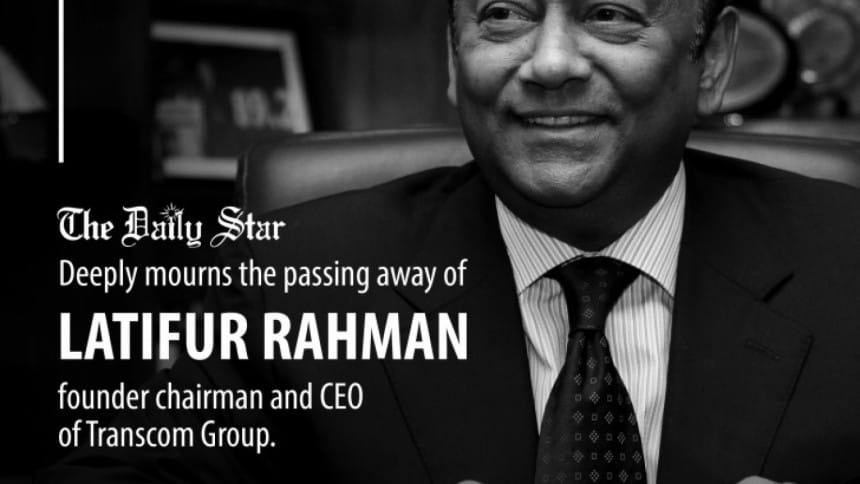Tribute to Latifur Rahman: Two independent newspapers were his gifts to Bangladesh

He was an editor's dream of an investor. But he turned out to be so much more. Yes, Matiur Rahman and I run the two papers -- Prothom Alo and The Daily Star respectively -- but it was he who made them happen, with his principles, integrity, courage, steadfastness, strength of character, and unswerving faith in independent media without which, he intuitively knew, that democracy could not flourish.
The Daily Star started when Ershad fell and like the rest of the nation, he also dreamt of a democratic Bangladesh and decided to team up with some other visionary investors and two journalists (SM Ali and myself) to help start an independent newspaper, of which he later became a driving force. Through his unstinting belief and support for freedom of the press, unrelenting focus on management and fanatical emphasis on strict financial discipline, he helped the creation of two independent newspapers which I consider to be his gifts to Bangladesh.
The cornerstone of the ethos that he -- and the rest of the board of directors who appreciated his stance -- represented was total editorial independence for the newspapers. In the nearly 29 years of The Daily Star and almost 21 years of Prothom Alo, for whose first 10 years I was its publisher, never did we receive any advice, suggestion or even a remote hint as to what should or should not be published, or how a news should be treated. Like everybody else he would read the newspaper in the morning. In this long journey it is quite possible that he may have disagreed with what we did but he never, even once, allow his views to override ours.
Even when he faced the wrath of the powers that be, simply because of what the two newspapers published, he would never allow that to affect our daily work. In fact, he would never even tell us that he lost certain contracts, or that his factories' permissions were delayed or denied, or that his expansion plans got derailed because of the way we were reporting, taking editorial positions or writing commentaries. There was never a word but that of standing steadfast behind the two newspapers.
An anecdote from the very first year of my editorship perhaps makes the point beautifully. The boss of a certain big business house asked Latifur Rahman why The Daily Star was publishing certain findings of the Bangladesh Bank, to which he said, "Why don't you talk to the editor, he runs the paper." To which the businessman replied with disbelief, "You are financing the paper and the editor runs the paper. How can that be?" Well that is how it was and has been all along, and that is what made The Daily Star what it is today.
The other fundamental belief he held most firmly was the need for democracy for Bangladesh to prosper. These two beliefs -- democracy and the need for a free and independent press -- fed into one another, making a symbiotic whole that formed the totality of his life's philosophy. That later turned into his life's passion – and it was my honour to be a humble part of the fulfilment of that passion.
He was a gentleman par excellence. With impeccable manners and immaculate courtesy, his was a personality that immediately drew the attention of any gathering both for his insightful observations and strongly held opinions. He would not invite controversy in a conversation but would not shy away from it if the situation so unfolded. He was a man of firm beliefs but always open to counter positions if they were well argued and supported by facts and logic. But challengers would soon become aware that he had his own arsenal of facts and logic which were formidable to say the least.
There was a hidden humour in his personality. He would not easily open up but once he would his hearty laughter would brighten up the occasion and enjoin everybody else in a merriment that was unforgettable.
Another unique aspect of his personality was the sense of dignity with which he always conducted himself. Even at his most tragic moments -- when he lost his daughter and years later, his grandson -- he bore these two incalculable losses with an inner strength and dignity that seemed to most of us as superhuman. In a strange coincidence, he passed away on the day of his grandson -Faraaz - falling victim to the dastardly act of cowardice by some beastly terrorists in Dhaka four years ago.
In the world in which he spent his whole life -- the world of business -- he was an iconic figure. He was respected by all, even those with whom he was not too popular. His honesty was awe striking and adherence to ethical business practice almost legendary. He was known to have given up many business opportunities because the deals were not cent percent above board. His reputation for honesty and integrity were unrivalled and he was universally respected for upholding the highest ethical standards in business.
At his untimely demise, my loss is both personal and professional and to say the least, incalculable. On a personal level he was a friend, a brother, a mentor, a source of strength when I felt weak, a support when I was not sure, a guide when options before me were not obvious. He became a brother when I lost all four of mine in quick succession and greatly helped fill a vacuum that would otherwise have remained with me forever. He was ever the fountain of courage for me whenever obstacles seemed too formidable. I often looked upon him in wonder as to how, a lifelong businessman, with no history of involvement in the media, could have such a strong, deep, and unshakeable faith in the virtues of a free press and such an ironclad commitment for its independence that played such a crucial part in fulfilling my personal dream of setting up an independent newspaper in Bangladesh. What began as a partnership in building an independent newspaper ended with a friendship that transcended into a spiritual bond of mutual love and respect.
It is with an unfathomable emptiness in my heart that I pay this humble tribute to the man to whom I owe so much.

 For all latest news, follow The Daily Star's Google News channel.
For all latest news, follow The Daily Star's Google News channel. 



Comments